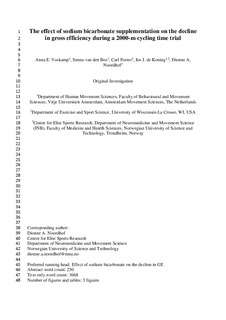| dc.description.abstract | Background: Gross efficiency (GE) declines during high-intensity exercise. Increasing extracellular buffer capacity might diminish the decline in GE and thereby improve performance. Purpose: To examine if sodium bicarbonate (NaHCO3) supplementation diminishes the decline in GE during a 2000-m cycling time trial. Methods: Sixteen male cyclists and 16 female cyclists completed 4 testing sessions including a maximal incremental test, a familiarization trial, and two 2000-m GE tests. The 2000-m GE tests were performed after ingestion of either NaHCO3 supplements (0.3 g/kg body mass) or placebo supplements (amylum solani, magnesium stearate, and sunflower oil capsules). The GE tests were conducted using a double-blind, randomized, crossover design. Power output, gas exchange, and time to complete the 2000-m time trials were recorded. Capillary blood samples were analyzed for blood bicarbonate, pH, and lactate concentration. Data were analyzed using magnitude-based inference. Results: The decrement in GE found after the 2000-m time trial was possibly smaller in the male and female groups after NaHCO3 than with placebo ingestion, with the effect in both groups combined being unclear. The effect on performance was likely trivial for males (placebo 164.2 [5.0] s, NaHCO3 164.3 [5.0] s; Δ0.1; ±0.6%), unclear for females (placebo 178.6 [4.8] s, NaHCO3 178.0 [4.3] s; Δ−0.3; ±0.5%), and very likely trivial when effects were combined. Blood bicarbonate, pH, and lactate concentration were substantially elevated from rest to pretest after NaHCO3 ingestion. Conclusions: NaHCO3 supplementation results in an unclear effect on the decrease in GE during high-intensity exercise and in a very likely trivial effect on performance. | nb_NO |
